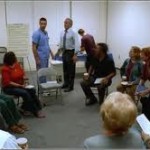Here it is, guys. A write-up of that talk I’m going to present. Actually, it’s a bit of an approximation, because I have to give another talk next week, before TED, at something called PINC, and I’m allowed 20 minutes instead of 8 minutes. So….this is more elaborate than what I can say on TED. It pretty much captures what I think about the issue of trust.
Nobody can trust an addict, least of all him- or herself. And that’s what I’m going to talk about: this lack of self-trust and why it’s so pivotal in addiction and recovery.
First — my history of addiction…(blah blah). And then, the 187th time I tried to quit, it actually worked. I think quitting became possible because, this time, I found a part of myself I could trust.
But why was it so difficult until then? Why is it so hard for addicts to “just say no?” We can answer this question only if we can explain what it is about addiction that works against self-trust.
There are two psychological phenomena that help explain it.
First phenomenon: Ego depletion. The inability of people to maintain impulse control for a long period of time.
Areas of prefrontal cortex in charge of self-control run out of fuel. Like muscles, these areas get weakened and strained with continuous use. So, you can maintain self-control for a while — but not for very long.

 Classic experiment described: subjects come to the lab hungry. They are told not to eat from either a bowl of chocolate chip cookies (one group) or a bowl of radishes (the other group) sitting right in front of them. After 10 or 15 minutes, they have to complete cognitive tasks requiring self-control. Those who had had to suppress their impulse to eat the cookies did less well on those tasks. They had used up some of that precious cognitive resource.
Classic experiment described: subjects come to the lab hungry. They are told not to eat from either a bowl of chocolate chip cookies (one group) or a bowl of radishes (the other group) sitting right in front of them. After 10 or 15 minutes, they have to complete cognitive tasks requiring self-control. Those who had had to suppress their impulse to eat the cookies did less well on those tasks. They had used up some of that precious cognitive resource.
 Ego depletion is a serious problem for addicts of all stripes: because the thing you’re trying to control is there all the time. The bar on the corner, the phone number of your dealer, waiting in the phonebook — cues associated with your addiction are always present.
Ego depletion is a serious problem for addicts of all stripes: because the thing you’re trying to control is there all the time. The bar on the corner, the phone number of your dealer, waiting in the phonebook — cues associated with your addiction are always present.
And addicts have to control their impulses, not just for minutes, but for hours, day after day, week after week. So, they run out of capacity, and they give in.
 Recent research shows: people who believe in their capacity for self-control are less affected by ego depletion. But why should this be so? How can a subjective state, a feeling, have such influence on a fundamental brain mechanism?
Recent research shows: people who believe in their capacity for self-control are less affected by ego depletion. But why should this be so? How can a subjective state, a feeling, have such influence on a fundamental brain mechanism?
I think it’s because, if you don’t believe you can do it, the task is actually two tasks. You have to control not only the impulse but also your own doubt. Trying to maintain that double inhibition, to maintain your confidence while controlling your actions…. it exhausts your resources all the sooner.
That makes it very tough for addicts. Why should they trust their impulse control? They’ve failed time after time. So for them, ego depletion is like a sledgehammer, quick to overwhelm them. And they fail yet again.
I’m always struck by a certain irony: People think addicts are weak and lazy. In fact it’s the opposite. Addicts work harder than anyone else at the task of self-control.
Second phenomenon: Delay discounting. This is the tendency to devalue long-term rewards in favour of immediate rewards. Example: You might choose 5 euros today vs. 20 euros in a week. The immediate reward is exaggerated in value.

 For addicts, this amounts to getting high tonight, or going to the casino, or eating the whole cake, at the expense of future happiness: e.g., having a happy marriage, a good figure, or keeping your job, or money in the bank, or staying out of jail. These future reward are devalued — they seem not to count for much.
For addicts, this amounts to getting high tonight, or going to the casino, or eating the whole cake, at the expense of future happiness: e.g., having a happy marriage, a good figure, or keeping your job, or money in the bank, or staying out of jail. These future reward are devalued — they seem not to count for much.
But the appeal of addictive substances and acts is made all the more powerful by the release of dopamine. Dopamine’s job is to rivet attention to immediate gains.
Dozens of studies show greatly increased dopamine when addicts encounter cues associated with their addiction. A kind of hyper-conditioning. This narrows their attention, and their desire — to what I call the neural now.
 The only antidote for this delay discounting may be: having a dialogue between your present self and your future self, whereby the future self takes your present self in hand and says: trust me — things will soon get better. Stick it out…with me.
The only antidote for this delay discounting may be: having a dialogue between your present self and your future self, whereby the future self takes your present self in hand and says: trust me — things will soon get better. Stick it out…with me.
But addicts have a very hard time seeing their future self as anyone but an addict.
Yes, addicts have dialogues with themselves, but the problem is that they can’t find a future self who is trustworthy, who can carry the present self past the intense attractions of “now”. Any future self they that’s credible is NOT where they want to end up. There is no future to value.
 Because it’s so hard to trust themselves, addicts trust the only thing they can trust: their drug, their drink, or the behavior that brings them temporary relief. And that works for a while, but then you wake up, empty, broke, betrayed, in even worse trouble, perhaps with withdrawal symptoms starting up….and you have failed yourself yet again.
Because it’s so hard to trust themselves, addicts trust the only thing they can trust: their drug, their drink, or the behavior that brings them temporary relief. And that works for a while, but then you wake up, empty, broke, betrayed, in even worse trouble, perhaps with withdrawal symptoms starting up….and you have failed yourself yet again.
Self-trust is hard for addicts to find, but when they find it, they may also find a pivot point. Their whole life can swing around: they may start controlling themselves because they believe they can, because they’ve caught a glimpse of a self they can rely on.
 Unfortunately, current treatment approaches often don’t encourage you to trust yourself. They encourage you to see yourself as a helpless addict, a person with a disease. They encourage you to trust in a higher power — in God, or the group, or the doctor — not in yourself . (Trust in the group is not a bad thing, and it may be a means to an end — the end being self-trust. But the question remains, do they help you find that self-trust?)
Unfortunately, current treatment approaches often don’t encourage you to trust yourself. They encourage you to see yourself as a helpless addict, a person with a disease. They encourage you to trust in a higher power — in God, or the group, or the doctor — not in yourself . (Trust in the group is not a bad thing, and it may be a means to an end — the end being self-trust. But the question remains, do they help you find that self-trust?)
Yet treatment centers based on empowerment are starting to spring up, and I think that’s an encouraging sign.
Here’s how I quit. Quitting attempt #187: I wrote the word “No” in big letters, tacked it to my wall, and recited it 50 times a day, so that I couldn’t stop imagining it. And I saw that I could keep saying “No,” next minute, next hour, next day. I’d found a way to believe in my ability to stop, and that felt like a new self — or at least a different part of myself — I could rely on.
So, for me, self-trust and recovery started at exactly the same moment. In a way they were the same thing, as self-trust initiated the first steps of recovery, and those steps reinforced the sense of self-trust.

Leave a Reply